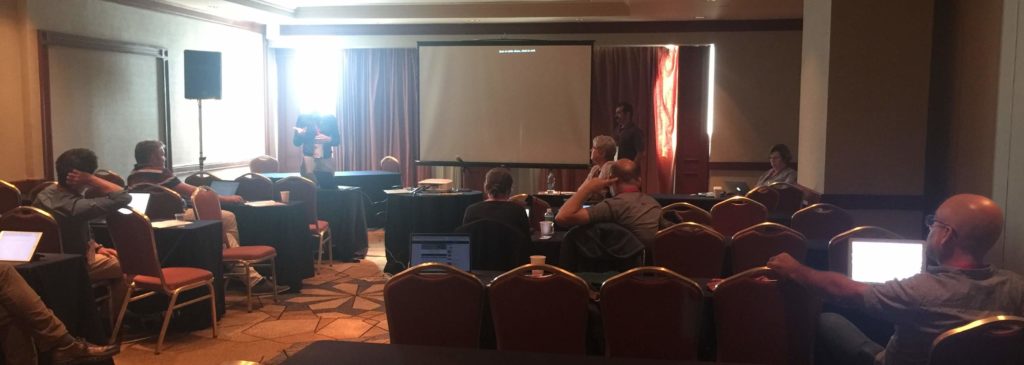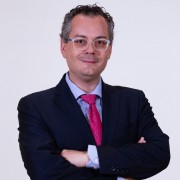A lo largo de esta semana se celebra en Ciudad de México el Congreso Internacional de Humanidades Digitales 2018 con el motivo “Bridges / Puentes”. Se trata de la primera vez que el congreso más importante en el mundo en este ámbito sale del espacio estadounidense y europeo, dando respuesta a una urgente demanda para generar más visibilidad para la investigación que se realiza en otras lenguas y tradiciones distintas a la que se desarrolla en lengua inglesa de forma preponderante. El Congreso está organizado por ADHO, El Colegio de México, la UNAM y de forma especial por la Red de Humanidades Digitales con Isabel Galina, Ernesto Priani, Miriam Peña y Elika Ortega, entre otros.
De entre las diversas propuestas que enviamos, hoy presentamos en el Encuentro “Innovations in Digital Humanities Pedagogy: Local, National, and International Training” la titulada “The Carmenta Program: A Way to Promote the Digital Humanities among Humanists and Technologists” enviada por Lidia Bocanegra y por mí, en la que presentamos el Programa Carmenta, cuyo objetivo es generar conexiones entre investigadores en Humanidades y Ciencias Sociales e investigadores en Informática con el fin de desarrollar conjuntamente trabajos Fin de Grado y de Máster con los estudiantes de informática, con el fin último de promover las Humanidades Digitales.
A continuación dejo el resumen de la presentación que he realizado esta mañana, así como el programa completo de este evento.

Propuesta: The Carmenta Program
Medialab UGR – Research Laboratory for Digital Culture and Society (http://medialab.ugr.es/), a lab created in 2015 within the Vice-Rectorate for Research and Knowledge Transfer, is committed to promote Digital Humanities in the University of Granada, from both educational and research perspectives.
In this line, Medialab UGR has developed several initiatives intended to extend DH in the syllabus and in the training of new researchers. The most important is the so called Carmenta Program, a way to promote the Digital Humanities among humanists and technologists. Carmenta was, in Roman mythology, goddess of childbirth and prophecy, and was associated with technological innovations. This point inspires a Program that is designed to help the emergence of works and research projects in Social Sciences and Digital Humanities. As long as it is not a simple task for humanists to acquire the necessary technological skills to undertake the digital transformation of their projects, the Carmenta Program aims to help social scientists and humanists to incorporate digital technologies in their projects, by putting them in contact with computer experts from the School of Computing Science of the University of Granada, a leading institution worldwide. Medialab promote the generation of research proposals that students of technical careers can address, contributing, on the one hand, to give a boost to research in the University of Granada and, on the other, to enrich their humanistic and social knowledge. The Program requires the participation of a student of Computer Science, a professor in Computer Science and a professor in Humanities in order to agree in a project that will promote Digital Humanities in the University. The student will work in this field through its final year project, incorporating in its CV a DH project. Projects submitted are related to the creation of apps, databases, web platforms, collaborative services, etc. in topics related to Literature, History, Art History, etc.
In addition to this Program, Medialab also has developed other programs to promote DH:
- Facultad Cero (http://facultadcero.org/): a process to redesign Higher Education that has incorporated the debate of fostering Digital Humanities in our University.
- Digital Humanities and Social Sciences of the South (http://cshdsur.es/): a collaboration between the Universities of Granada and Malaga that seeks to promote DH among researchers and students of both Universities.
- International Conference “Digital Territories” (http://medialab.ugr.es/i-international-conference-digital-territories-2017/): a conference to allow students and researchers to show their works in the field of DH.
Programa: Innovations in Digital Humanities Pedagogy: Local, National, and International Training
Digital Humanities Pedagogy @ DH 2018 coming up on June 25 in Mexico City.
8.45-9.00: Registration
9.00-9.30: Welcome and Opening Remarks, Why We Need A Training Network SIG
Ray Siemens (U Victoria), Diane Jakacki and Katie Faull (Bucknell U)
9.30-10.10: Lightning Talk Session #1 (10 minute papers + discussion)
Chair: Katie Faull
- Angelica Huizar (Old Dominion U): “Implementing Innovations in DH Pedagogy in the Latin American Studies Curriculum”
- Esteban Romero-Frías (Medialab, U Granada): “The Carmenta Program: A Way to Promote the Digital Humanities among Humanists and Technologists”
- Brian Croxall (Brigham Young U): “A Tale of Two Minors”
10.10-10.50: Lightning Talk Session #2 (10 minute papers + discussion)
Chair: Diane Jakacki
- Ray Siemens (U Victoria): “Supporting a Social Knowledge Approach, in a Teaching Environment”
- Erik Simpson (Grinnell C): “Digital Bridges: The Pleasures and Challenges of Inter-Institutional Collaboration in DH”
- Brian Croxall (Brigham Young U): “Intro to Digital Humanities” and the Inevitable Next Step: Two Syllabi”
10.50-11.00: Break
11.00-11.40: Lightning Talk Session #3 (10 minute papers + discussion)
Chair: Ray Siemens
- Tanja Wissik (Austrian Academy of Sciences): “The Role of Research Infrastructures in the Area of Education and Rraining: The DH Course Registry and the dariahTeach Platform as Examples”
- Walter Scholger (U Graz): “Efforts Towards a Digital Humanities Reference Curriculum in Europe”
- Elisabeth Burr (U Leipzig): “Digital Humanities in the Humanities: Core Concepts and Core Competencies”
11.40-12.00: Break
12.00-3.00: Member Meeting
- 12.00-1.00: Working lunch (for those registered). Discussion of SIG Goals, Structure (Ray Siemens, presiding)
- 1.00-2.00: SIG Proposal Sprint, Breakout Groups
- 2.00-2.30: SIG Proposal Sprint Groups, Report Out (Katie Faull, presiding)
- 2.30-3.00: Final SIG Proposal Review and Submission (Diane Jakacki, presiding)

